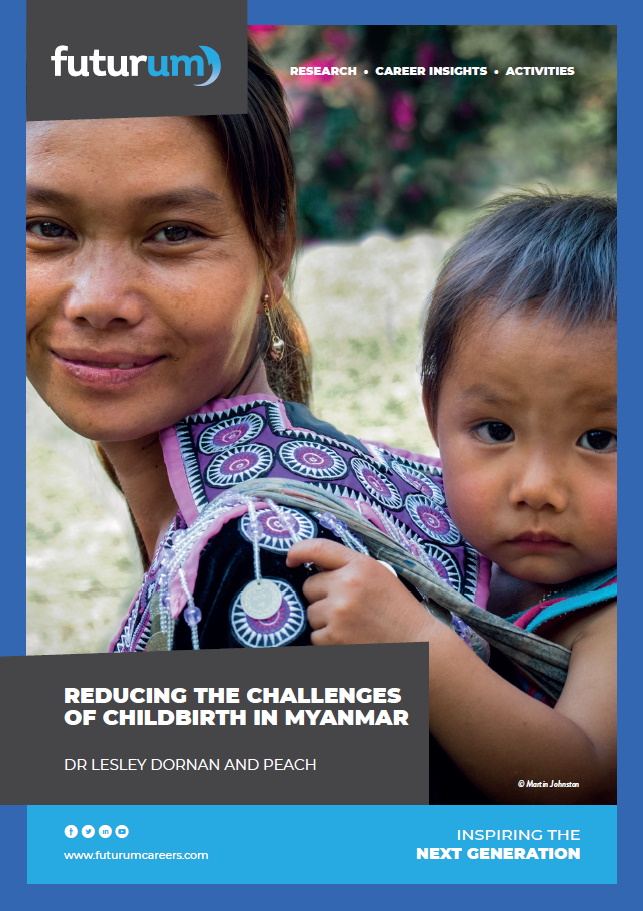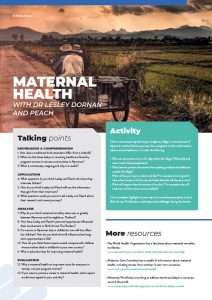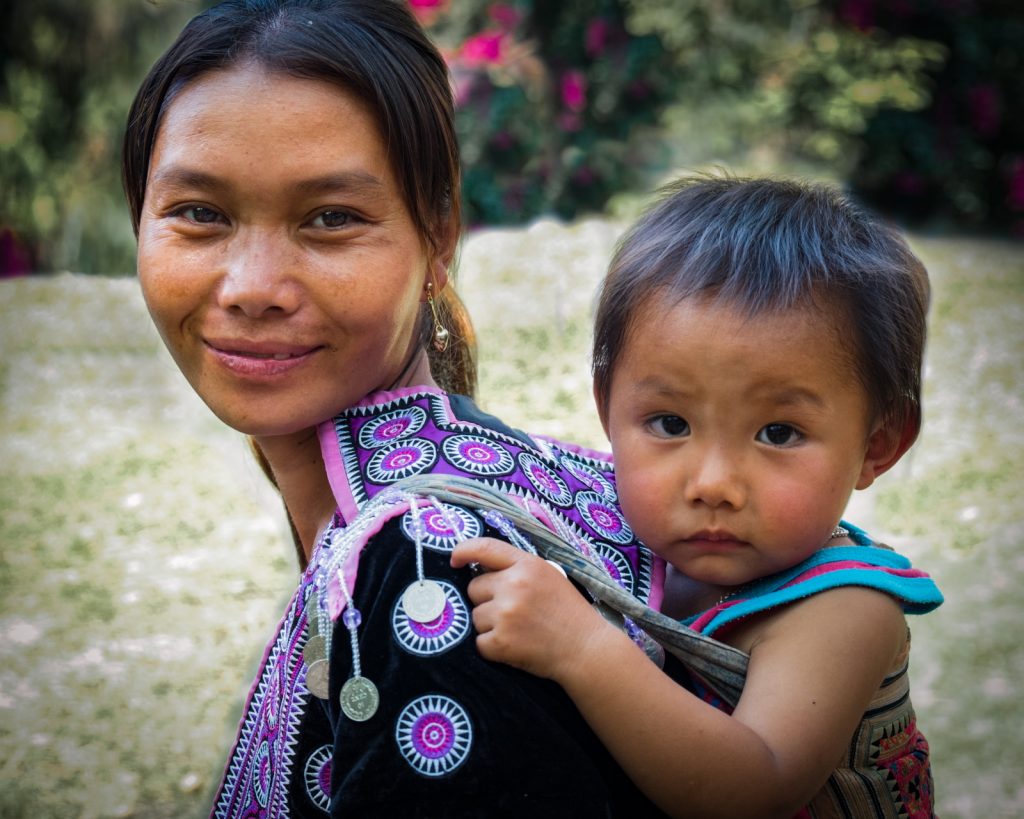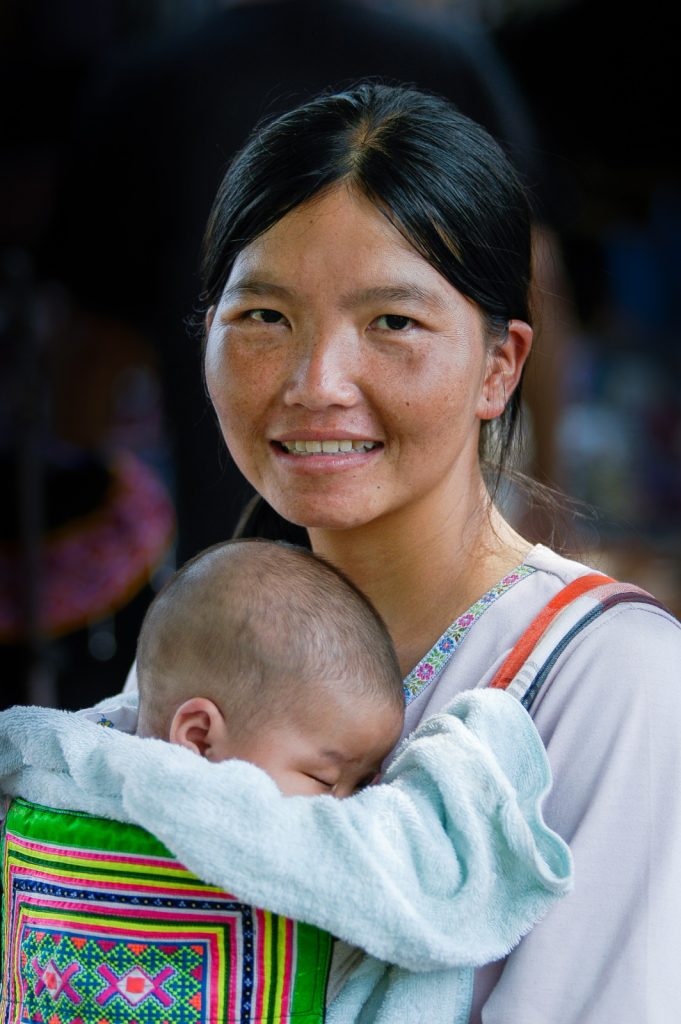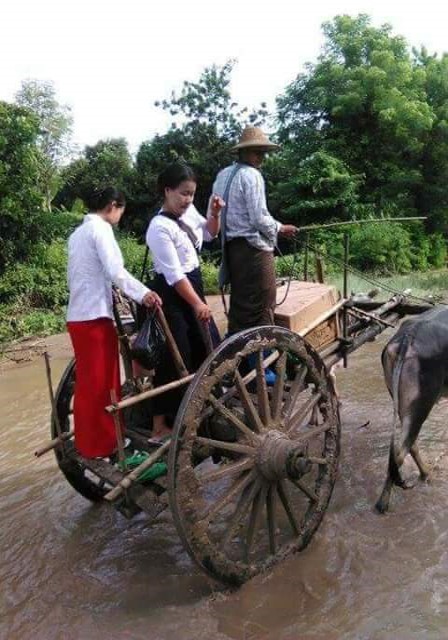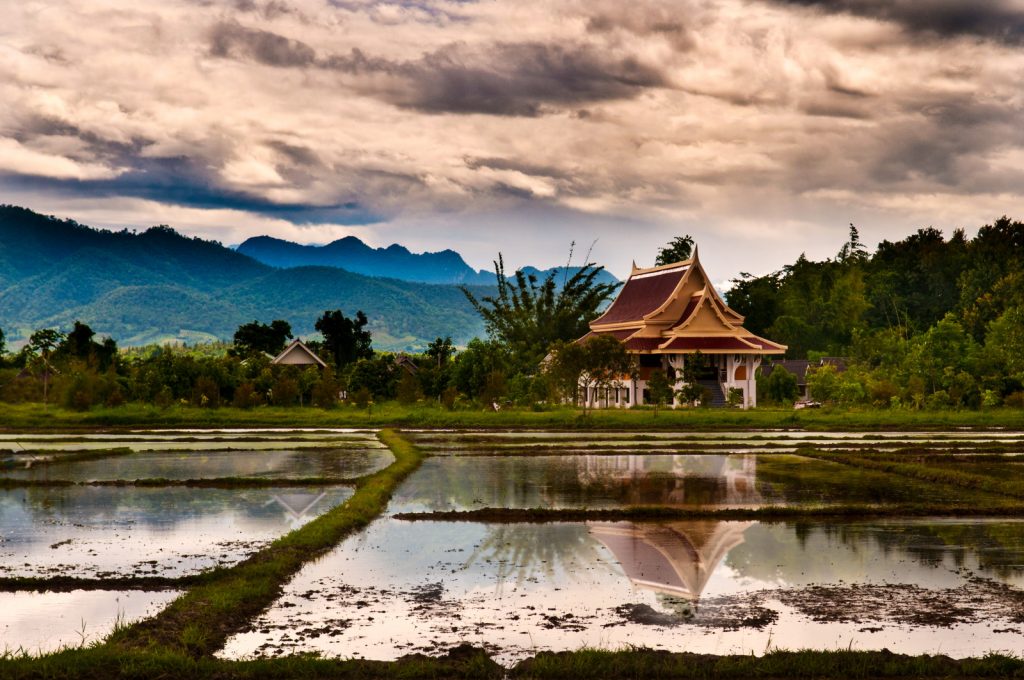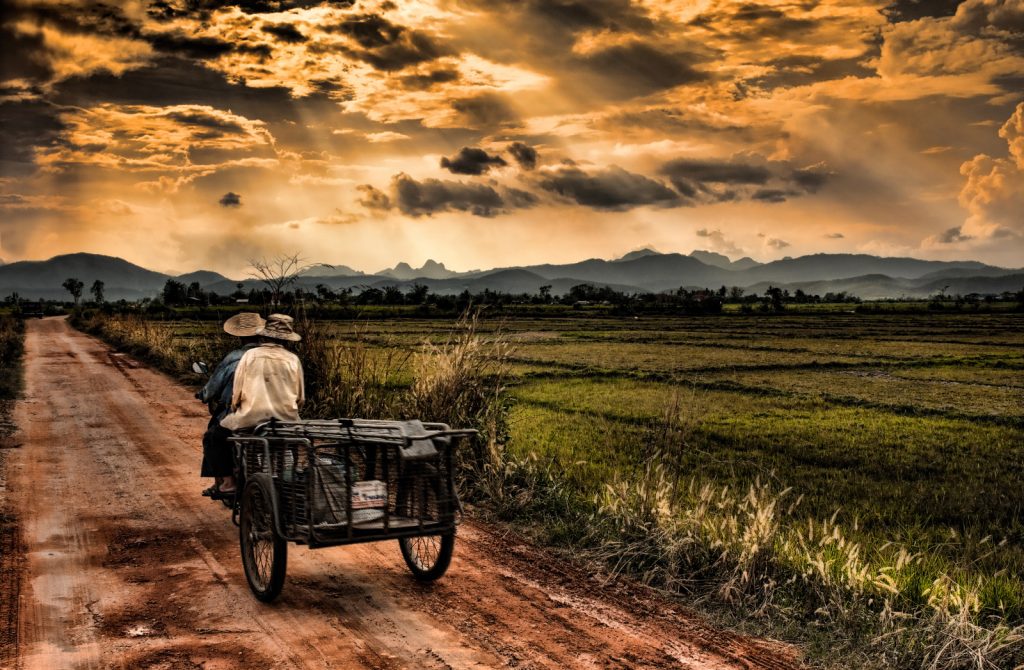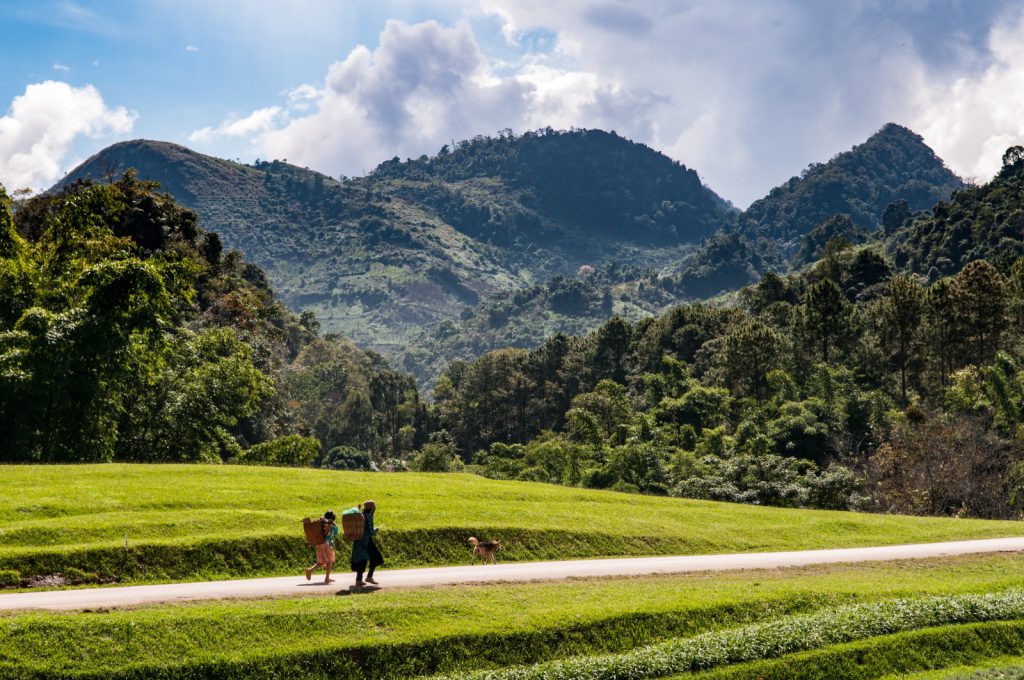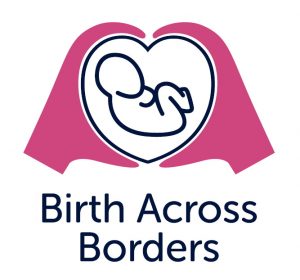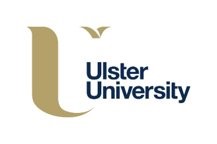Reducing the challenges of childbirth in Myanmar
In Myanmar, one in every 500 women is likely to die during pregnancy or childbirth. The Birth Across The Borders project is determined to reduce this terrible statistic. Led by Professor George Kernohan and Dr Lesley Dornan at Ulster University, UK, and working with researchers in Myanmar and Thailand, such as Peach, Birth Across The Borders aims to improve maternal health for women in remote communities in Myanmar.
Talk like a maternal health researcher
Community mapping — a research method in which residents identify the resources in their community and build a picture of the challenges and opportunities
Maternal — relating to a mother
Maternal mortality rate — the number of women who die during pregnancy or childbirth, per 100,000 births
Midwife — a qualified professional who assists a woman during childbirth
Obstetric — relating to pregnancy and childbirth
Traditional birth attendant (TBA) — a person who assists a woman during childbirth who has no formal professional training
Located in Southeast Asia, Myanmar is a beautiful country of rocky mountain ranges, dense jungles and golden sandy beaches. With over 100 different ethnic groups, it has a rich cultural diversity. But Myanmar is a country facing significant difficulties. It has a long history of ethnic conflict and has been severely affected by COVID-19 and political changes in recent years. These challenges contribute to the country’s very high maternal mortality rate: of every 100,000 women who give birth, over 200 of them will die. In comparison, 21 women per 100,000 will die in childbirth in neighbouring Thailand, while in the UK the maternal mortality rate is 12.
Dr Lesley Dornan, a maternal health researcher at Ulster University, is co-leading the Birth Across The Borders project, investigating the challenges facing women in Myanmar during pregnancy and childbirth. By working with local communities and healthcare practitioners, Birth Across The Borders aims to improve maternal health in Myanmar through the power of education.
The challenges of childbirth in Myanmar
It can be very difficult for people in remote communities in Myanmar to access healthcare. Many families cannot afford it, either because they cannot afford the clinic fees, or because they cannot afford to travel to reach a clinic. Most villages do not have healthcare facilities so to receive professional medical help, people must leave the safety of their community and travel long distances. During the rainy season, rivers may be flooded and jungle paths may be washed away, while in the cold season, mountain passes may become dangerous to cross. These challenges are even greater for women in labour. While most communities have a traditional birth attendant (TBA) who is responsible for delivering babies, if there is an emergency during pregnancy or childbirth, the mother will need to receive professional help.
Lesley references the ‘Three Delay Model’ to explain the core reasons why women cannot or do not access medical care during pregnancy or childbirth. The first delay is in the woman’s decision to seek professional help. This may be due to a poor understanding of pregnancy and childbirth and a lack of knowledge about when things are not progressing as they should, or due to the status of women preventing them from making decisions. “The traditions, behaviours and practices of the community mean it can be hard for pregnant women to decide when they should leave the community to seek professional care,” explains Lesley.
Once a woman has decided to seek help, the second delay is in reaching a healthcare facility. This is due to the challenges of travelling in remote mountainous regions with little or no transport infrastructure. The third delay occurs once the woman eventually arrives at the clinic, if poor facilities or inadequate referral systems result in her having to wait to be seen by healthcare professionals.
Lack of access to education
Birth Across The Borders aims to improve the situation for pregnant women in Myanmar by harnessing the power of education. “Education is something we take for granted,” says Lesley. “It is only when we don’t have it that we realise how influential education is.” Many families in Myanmar cannot afford to send their children to school. Peach, one of the regional coordinators for the project, explains that in many remote communities, education does not occur in schools run by trained teachers, but in temples run by monks. “This means not everyone can access education and girls are often excluded,” she says. “We want to improve education so children have opportunities for a better life, but it can be hard to change the traditional views and behaviours in communities.” Even in regions where girls can attend schools, ongoing conflict means it is often unsafe for them to travel outside their village.
Collecting data
To gain a better understanding of maternal health in remote communities, Lesley and Peach are conducting interviews to collect data about women’s experiences of pregnancy and childbirth by asking questions such as how many pregnancies they have had, how many children they have given birth to, and how difficult it was for them to access healthcare. The team also interviews village TBAs about infant healthcare to discover what traditional practices occur after birth, and fathers, as the fathers’ experiences are equally important. “The father interviews tell us how men care for their wives while they are pregnant and how this relates to the local culture,” explains Peach.
Birth Across The Borders is also investigating what emergency obstetric care is available when problems occur. While most villages have a TBA, emergency care is rarely available in remote communities. As well as analysing where clinics are in relation to villages, the team is interviewing women who have had an emergency during pregnancy or childbirth, and the healthcare professional involved in emergency obstetric care, such as midwives and doctors in clinics.
The team is also conducting community mapping to understand the context of each community. “With mapping, we look at the culture of the community,” explains Peach. These maps not only highlight what resources (such as clinics, schools, roads, and water and electricity supplies) are available or absent, but how the people view the community. As well as creating maps of the present, community members are asked to create maps showing how they hope their village will look in five years’ time. “Many impoverished communities live day to day and don’t think much about the future,” says Lesley. “Asking them about their hopes and dreams can change their perspective and gives us an understanding of how our resources can help them achieve those dreams.”
Project goals and aspirations
A central goal of Birth Across The Borders is to provide education that will help pregnant women and mothers avoid dangerous situations in the future. “We want women to know when they might need to seek help during a pregnancy and we want them to know when they absolutely need to go to a clinic, to prevent the delay in them seeking care,” explains Lesley. “We will also work in partnership with local organisations to train healthcare workers in basic emergency obstetric care. Across Myanmar, healthcare workers are doing amazing work to help women, and we hope to complement what is already being done.”
Birth Across The Borders is very focused on designing educational resources that are practical and make sense in the communities, which means they take local cultures into account. “There are some traditional things we can’t change,” says Peach. “For example, men do not want to touch the blood of the women who are about to give birth and we can’t do anything about that. However, we can talk to men about how they can support their wife during pregnancy, how they can transport her to hospital and how they can help during emergencies.”
Reference
https://doi.org/10.33424/FUTURUM326
The project also hopes to improve the situation for communities by promoting social enterprises. For example, if women with sewing skills are encouraged to sell their products or supported to develop a small business, this will provide them with an income. This money will hopefully lessen the financial difficulties that many families in remote communities face, enabling them to access medical care and send their children to school. “The concept of social enterprise is that the extra income will not only help the individual woman, but it will feed back into the village and help the whole community,” explains Peach.
Lesley and Peach hope that the efforts of Birth Across The Borders will help to reduce maternal mortality rates in remote communities in Myanmar, alongside improving the well-being of women, families and communities. As Peach says, “Even small changes can have large impacts on someone’s life.”
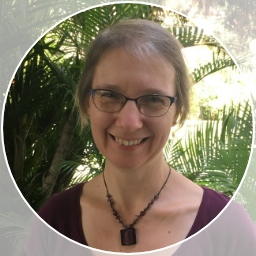 Dr Lesley Dornan
Dr Lesley Dornan
School of Nursing, Ulster University, UK
Southeast Asia Research Lead, Birth Across The Borders
Field of research: Maternal Health
Peach
Regional Coordinator, Birth Across The Borders
Research project: Birth Across The Borders aims to improve maternal health in Myanmar through the power of education
Funders: Economic and Social Research Council (ESRC), Global Challenges Research Fund (GCRF)
ABOUT MATERNAL HEALTH
Maternal health refers to any aspect of a woman’s physical, mental or emotional health, during or after pregnancy. As such, it is an extremely important area to work in. The World Health Organization has recognised the challenges of maternal health as a global health priority due to the unacceptably high maternal mortality rates that exist in some areas of the world. Pursuing a career in maternal health is an incredibly rewarding way to help others.
“Maternal mortality doesn’t just impact the mother and baby,” explains Lesley. “It impacts the whole family. When a family loses a mother, the opportunities for children to live the life they deserve as children is quite often taken away.” In many countries, children are forced to leave school to care for younger siblings if their mother dies, denying them the right to their education.
The joys of working in maternal health
Knowing they are contributing to improving the lives of individuals, families and communities means Lesley and Peach both find great enjoyment and satisfaction from their involvement with Birth Across The Borders. “We’re part of the tapestry of the story of Myanmar,” says Lesley. “We’re just one small part of this tapestry, but it it’s a real privilege to be part of it.”
Although the team has faced many challenges due to conflicts, COVID-19 and political changes, the project has had enormous success. “The strength of the friendships and relationships that have developed is one of the greatest rewards of Birth Across The Borders,” says Lesley. “The communities have been amazing and the commitment of our in-country partners and staff has been phenomenal.”
“I came to Birth Across The Borders because I now live comfortably in Thailand, but I know how tough life is where I’m from in Myanmar,” says Peach. “In this project we have learnt many things about how difficult the situation is for pregnant women but we have also learnt how improvements can be made. If I can help just one woman or child in Myanmar to have a better life, then I will be happy.”
Pathway from school to maternal health
• With so many professions dealing with maternal health, there is no one pathway leading to a career in the field. Research your options to find the route that best fits your interests.
• To work as a maternal healthcare professional, consider a degree in midwifery or medicine (specialising in obstetrics and gynaecology). You could also get a degree or do an apprenticeship in nursing.
• If you are interested in maternal health research, you could study public health at university.
• Try to find work experience in healthcare settings or with mothers. For example, Lesley recommends volunteering with mother and baby groups in your local community. “Look for opportunities where you can connect with mothers in different ways and hear some of their stories,” she advises.
Explore careers in maternal health
• “There are many important roles in maternal health,” says Lesley, who originally trained as a health visitor before becoming a maternal health researcher. “Obvious roles include working as a midwife or home health visitor, but you are also likely to encounter mothers if you work in any healthcare profession.” For example, general practice doctors, specialist doctors and nurses are all likely to work with pregnant women.
• The World Health Organization (WHO) provides information about the challenges relating to maternal health around the world and how the WHO is addressing them: www.who.int/health-topics/maternal-health
• The NHS provides information about careers in midwifery (www.healthcareers.nhs.uk/explore-roles/midwifery), medicine (www.healthcareers.nhs.uk/explore-roles/doctors) and nursing (www.healthcareers.nhs.uk/we-are-the-nhs/nursing-careers).
Meet Lesley
What motivated you to establish Birth Across The Borders?
I spent ten years living in Thailand and working as a health visitor in Southeast Asia where I had the opportunity to see families in many different settings. One day, someone told me of the difficulties women were facing during pregnancy and childbirth in remote areas of Myanmar. As I listened, I thought: Why is this not being heard? How is this still happening in today’s world? Birth Across The Borders was developed out of that initial conversation and my desire to try and make a positive difference.
My grandmother died when my mum was young, so she and her sister were put into an orphanage. I saw the impact that not having a mother had on them, and I also saw the knock-on effect it has had through the generations in terms of mental health and maternal bonding. This personal experience is one of the things that drives me in this project. I want to do everything I can to prevent the same happening to other families, because I know the cost it can have.
How did your PhD research contribute to the creation of the project?
My PhD was based on how the culture within Thailand influenced women’s choices, opportunities and decision-making surrounding breastfeeding. During this research, I recognised how broad culture, and its influence on our lives, is. Our cultures form who we are as people and inform the choices that women make during pregnancy and childbirth.
Why are you passionate about improving maternal health in Myanmar?
Myanmar is an incredibly beautiful country with amazing people who have had some really difficult times, and they deserve more. I believe that, despite everything, there is a resilience within these communities. I want them to have access to resources and to see their children grow up in healthier and happier environments.
What were your interests when you were younger?
I grew up with a fascination of different cultures and a desire to travel and experience them. I also enjoyed reading and loved getting lost in books. I wasn’t passionate about education and I didn’t do well in school, but I had a curiosity about the world that has stayed with me through my life.
What do you enjoy doing in your free time?
I still love to disappear into a book. I’ve had the privilege of doing a lot of travelling over the years, and I love exploring the world and meeting new people, hearing their stories and sharing their culture.
Meet Peach
What does your role as regional coordinator for Birth Across The Borders involve?
I communicate with all the other team members, including Lesley and my operational team in Myanmar, updating everyone about the progress of our work. I select the sites for the data collection and coordinate with community leaders in Myanmar, then I help collect and analyse the data we gather. I also help develop and deliver the maternal health education resources we are creating.
Who or what inspires you to do this work?
I’m from Myanmar but my mum and I moved to Thailand when I was three. My mum worked really hard to take care of me because she couldn’t see any opportunity for a better life for us in Myanmar. My relatives say that my mum is a fighter – she is my idol! She taught me to be patient and to do my best.
Why are you passionate about improving maternal health in Myanmar?
Although I grew up in Thailand, I can still feel how tough life is back in Myanmar. I am very grateful for living a comfortable life in Thailand and I want to help people in my village in Myanmar have a better life. I want them to have access to healthcare and education. People should not have to worry about whether they’ll have food to eat tomorrow or if it is safe for their kids to go to school or what to do if their wife gives birth. In the future, I hope that mothers and children can access healthcare and know how to take care of themselves.
What were your interests when you were younger?
I had so many interests when I was younger, but the one that never changed was my interest in travel, culture and language. I like understanding how people live differently and how they think differently. I’ve realised that while we can’t always understand each other, we can accept each other.
What do you enjoy doing in your free time?
I live in a beautiful province in the north of Thailand where there are many mountains and a peaceful pace of life. I enjoy going into nature because it reduces my stress. It makes me feel like myself again when I can spend time outside and take a deep breath.
Peach’s top tips
1. Everything in life is possible if you are patient.
2. Always give your best at everything you do.
3. Take all the opportunities that come your way in life.
4. When you have enough for yourself, don’t forget to give to other people around you.
Do you have a question for Lesley or Peach?
Write it in the comments box below and Lesley or Peach will get back to you. (Remember, researchers are very busy people, so you may have to wait a few days.)

